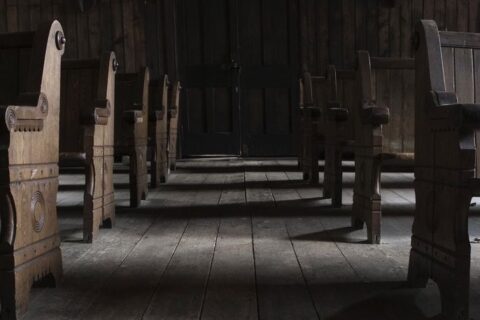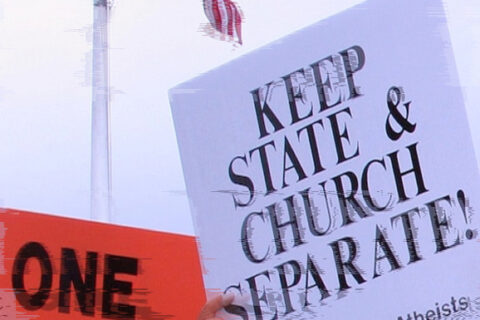Louisiana’s governor, Jeff Landry, has gotten his nose bent out of shape over the LSU women’s basketball team not showing proper respect for the ‘national anthem’. This is a monumental waste of time and energy. There are much more important things here in Louisiana he should be focused on (like the La. Legislature’s current session, to name but one). Besides that, there simply was no anthem for the [u]nited States prior to 1931. Why get your underwear bunched up over something that is such a novelty?
But it is worse than all that. All those songs that people consider in some sense to be national anthems of the uS are very worldly minded:
There is hardly any mention of God in them, and no mention of Jesus Christ a ’tall. And when God is mentioned, the invocation is inevitably tangled up with building the Kingdom of Man, not the Kingdom of God. Regrettably, as dear as the song ‘Dixie’ is to our people, its lyrics are also bereft of any real spiritual depth and value. For the Christian Southern people, we must do better. We can, in fact, do much better. For there is a hymn to the Lord Jesus and His Life-Giving Cross, sung on the Third Sunday of Lent in the Orthodox Church (the Sunday set aside to honor the Cross of Our Lord midway through Lent) that would serve as a wonderful anthem for our people. The lyrics are as follows:
Come, O believers, let us venerate the life-giving Cross. For Christ, the King of glory, voluntarily extended His hands on it and raised us up to the original blessedness, after the enemy long ago had captured us with the bait of pleasure, and caused us to be exiled from God. Come, O believers, let us venerate the Cross, by which we have been granted to crush the skulls of our invisible enemies. Come, all you families of the Gentiles, let us sing hymns to honor the Cross of the Lord. “We salute you, O Cross, for you are the complete redemption of Adam who had fallen. In you our most faithful leaders boast, for by your power they have mightily subdued the foreign enemy. Now we Christians with fear and awe salute you with a kiss, and we glorify God who was nailed to you, and we say, ‘O Lord, who were nailed to the Cross, have mercy on us, for You are good and benevolent.’” (Source; music sheets for singing this hymn are here.)
This hymn resonates in powerful ways with themes dear to the Southern heart: salvation from sin and death, heroism, Christian leadership. In explaining the Sunday of the Holy Cross, the Church emphasizes these points while also drawing out others that Southrons can relate closely to (Eden/Paradise, heavenly joy, agrarianism, Resurrection, etc.):
As we have “crucified the flesh with its passions and desires” (Galatians 5:24), and will have mortified ourselves during these forty days of the Fast, the precious and life-giving Cross is now placed before us to refresh our souls and encourage us who may be filled with a sense of bitterness, resentment, and depression. The Cross reminds us of the Passion of our Lord, and by presenting to us His example, it encourages us to follow Him in struggle and sacrifice, being refreshed, assured, and comforted. In other words, we must experience what the Lord experienced during His Passion – being humiliated in a shameful manner. The Cross teaches us that through pain and suffering we shall see the fulfillment of our hopes: the heavenly inheritance and eternal glory.
As they who walk on a long and hard way and are bowed down by fatigue find great relief and strengthening under the cool shade of a leafy tree, so do we find comfort, refreshment, and rejuvenation under the Life-giving Cross, which our Fathers “planted” on this Sunday. Thus, we are fortified and enabled to continue our Lenten journey with a light step, rested and encouraged.
Or, as before the arrival of the king, his royal standards, trophies, and emblems of victory come in procession and then the king himself appears in a triumphant parade, jubilant and rejoicing in his victory and filling those under him with joy, so does the Feast of the Cross precede the coming of our King, Jesus Christ. It warns us that He is about to proclaim His victory over death and appear to us in the glory of the Resurrection. His Life-Giving Cross is His royal scepter, and by venerating it we are filled with joy, rendering Him glory. Therefore, we become ready to welcome our King, who shall manifestly triumph over the powers of darkness.
The present feast has been placed in the middle of Great Lent for another reason. The Fast can be likened to the spring of Marah whose waters the children of Israel encountered in the wilderness. This water was undrinkable due to its bitterness but became sweet when the Holy Prophet Moses dipped the wood into its depth. Likewise, the wood of the Cross sweetens the days of the Fast, which are bitter and often grievous because of our tears. Yet Christ comforts us during our course through the desert of the Fast, guiding and leading us by His hand to the spiritual Jerusalem on high by the power of His Resurrection.
Moreover, as the Holy Cross is called the Tree of Life, it is placed in the middle of the Fast, as the ancient tree of life was placed in the middle of the garden of Eden. By this, our Holy Fathers wished to remind us of Adam’s gluttony as well as the fact that through this Tree has condemnation been abolished. Therefore, if we bind ourselves to the Holy Cross, we shall never encounter death but shall inherit life eternal.
Imagine, dear friends! An anthem for Dixie that, when sung, would bring all these things to mind, time after time, year after year. How much more beneficial would it be than those listed above. May God grant us leaders in all spheres of life who will let ‘the dead bury their own dead’ (the adherents of Americanism and its Godless anthems) and instead deepen Dixie’s oneness with the All-Holy Trinity, the Father, Son, and Holy Ghost.
As we take our leave, one more hymn in honor of Our Lord and His Holy Cross, Realities worthy of much meditation:
Now the flaming sword no longer guards the gates of Eden; / it has mysteriously been quenched by the wood of the Cross! / The sting of death and the victory of hell have been vanquished; / for You, O my Savior, have come and cried to those in hell: / “Enter again into paradise.”
-By Walt Garlington

O I’m a good old rebel, now that’s just what I am. For this “fair land of freedom” I do not care at all. I’m glad I fit against it, I only wish we’d won, And I don’t want no pardon for anything I done.






The problem is the governor is appealing to his base. Dixie is fat with waddling drones who worship many idols of the occupying empire including bad songs only sung before sportsball and Motorsport events which also front for Zionist dotmil recruiting.
The problem is the religion of the SEC, the detritus of the cultural rot that folks cling to because the pride of our people has been beaten out of them and replaced with hollow pursuits of the ghetto urban blight.
The flight north of the dark chattel has come full circle but now rule over the hearts and minds of the young.
It’s like the normiecons obsessed with trannies in girls sports instead of the fact that the boys are destroyed and the girls are no longer even expected to become women but instead more compliant and cooperative boys-lite in the wage slave pods.
In 1931 at least Dixie could root for white farm boys playing sport. It’s all colored ghetto now. Humiliation rituals so layered that nobody wants to start the process of digging out because it’s icky to realize our part in this.
Far easier to appeal to some imagined middle ground where we can have nice things and distractions from our captors alongside Dixie aspirations. The sooner this dream is shattered the better.
Your point is well-taken but I’d still rather just bring “Dixie” back.
America has started apeing Japan in the sense that while “Father Christmas” is a pretty big hit there, Jesus Christ… not so much. The premises of American constitutional republicanism were flawed… false… right from the start.
We’re just living out the inescapable conclusion of the false premises.
“The premises of American constitutional republicanism were flawed… false… right from the start.”
Sounds like you’re ripe for the book I’m reading right now: Lawrence Dennis’s “The Dynamics of War and Revolution” written in 1940. He didn’t foresee the capitalistic democracies’ alliance with Stalin’s Russia (a big oversight), but his other observations about the international money power (that had its locus in London) are spot on.
Forgot God Save the South?
Christian as it gets, albeit burrowed from the United Kingdom’s anthem.